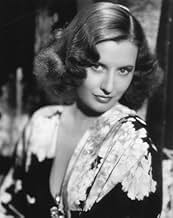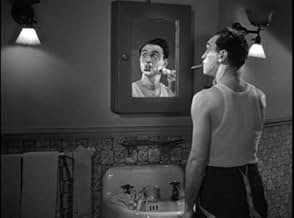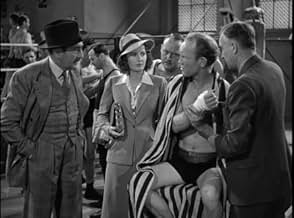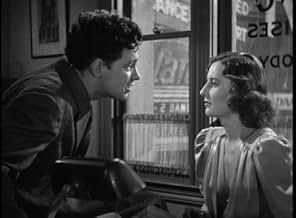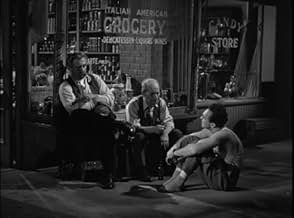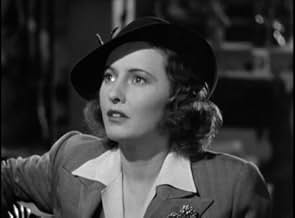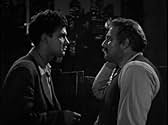VALUTAZIONE IMDb
6,8/10
2284
LA TUA VALUTAZIONE
Aggiungi una trama nella tua linguaA poor young Italian man, who is a virtuoso on the violin, wishes to become a champion boxer to make a fortune for his family. But what is the road to success and happiness, and what is the ... Leggi tuttoA poor young Italian man, who is a virtuoso on the violin, wishes to become a champion boxer to make a fortune for his family. But what is the road to success and happiness, and what is the price?A poor young Italian man, who is a virtuoso on the violin, wishes to become a champion boxer to make a fortune for his family. But what is the road to success and happiness, and what is the price?
- Regia
- Sceneggiatura
- Star
- Candidato a 1 Oscar
- 1 vittoria e 1 candidatura in totale
Edward Brophy
- Roxy Lewis
- (as Edward S. Brophy)
Charles Halton
- Newspaperman
- (scene tagliate)
Stanley Andrews
- Driscoll - Fight Official
- (non citato nei titoli originali)
Gordon Armitage
- Fighter
- (non citato nei titoli originali)
Earl Askam
- Policeman
- (non citato nei titoli originali)
Don Brodie
- Reporter
- (non citato nei titoli originali)
Mushy Callahan
- Fight fan
- (non citato nei titoli originali)
Dora Clement
- Ill Ringsider Who Won't Leave
- (non citato nei titoli originali)
Recensioni in evidenza
Well-written and well-acted vehicle serves as William Holden's entree to stardom. He was just 21 and is easier to recognize in his opening scene by his voice rather than his boyish looks and longish hair. Regardless of what it took to get him to give this performance, it is one that will be long remembered. Barbara Stanwyck plays the tough cookie who discovers she has a heart of gold, reminiscent of her role later perfected in "Meet John Doe." When asked if she was Adolphe Menjou's girl, Barbara replies "I'm my mother's girl." Great cast of supporting character actors add to enjoyment of a solid production whose best scenes involve family and not the ring. Good camera work, especially of those fight scenes, excellent sets, and great direction make this a surprisingly good night's entertainment. I avoided it for years thinking this was just another fight movie -- it is not -- and am now sorry that I waited.
While 1939 has been properly established as a year of many exceptional films of the American cinema, my favorite actor, Miss Barbara Stanwyck, starred in two: The DeMille epic UNION PACIFIC, and this Clifford Odets' play-turned-movie, GOLDEN BOY. While this film is usually recognized as the one that made William Holden a star, equally famous is the story of how he would have been fired from the film during production had it not been for veteran Stanwyck sticking up for him, insisting that they give him a chance, and then helping him to be a success. There were no shortages of established leading men waiting in the wings for this coveted role, so Barbara's unselfish act forged a life-long relationship between them for which Holden thanked her with a gift of roses each year on the anniversary of the film's opening. In one review, Richard Corliss writes, "...Stanwyck godmothered the young William Holden to stardom and earned his lifelong devotion." I'm sure this real life teacher/student relationship is also mirrored in the actual drama that unfolds on the screen. In spite of their difference in age, however, it's not as vast as the Holden/Swanson relationship in SUNSET BOULEVARD, and the chemistry on Golden Boy is more evenly matched and more appealing. Furthermore, the supporting cast of Aldophe Menjou, as the boxing manager, Lee J. Cobb as Holden's dad, and Sam Levene as Holden's brother-in-law is so tightly woven that the movie has all the charm and intensity of the Broadway play on which it is based. A memorable line that Stanwyck delivers when she is luring the golden violin prodigy from practicing his scales to make some extra dough on the side as a prizefighter is, "...you take a chance the day you are born, so why stop now?" When he doesn't at first take the bait, watch out for the dated line, "I'll see you in 1966 when, by then, you may have become somebody..." Of course, thanks to Barbara, it happened in 1939. This is an extremely satisfying film suitable for the whole family.
Notable for being William Holden's debut (he was just 21 and looks almost like a schoolboy!), this dated melodrama was adapted from a popular play by Clifford Odets dealing with a young man conflicted about which path to take in his life: a respected artistic career playing the violin and the more alluring celebrity (which also reaps instant monetary rewards) as a prizefighter. His Italian immigrant father (Lee J. Cobb, whose mannered performance has been especially criticized) obviously wants the boy to follow his musical instincts, but the pull of the ring is too great more so because through it he meets and falls for Barbara Stanwyck, actually his manager (Adolphe Menjou)'s fiancée. Though initially acting under the latter's instructions, she eventually tries to dissuade him from fighting, particularly when gangster Joseph Calleia (another fine showcase for the Maltese character actor) takes Holden under his wing. The climax sees the hero winning the championship bout but at the cost of his black opponent's life and his own left hand; with the help of Stanwyck (realizing she really loves the boxer, Menjou relinquishes her) the "Golden Boy" stands up to his new boss interestingly, Calleia lets him off rather too easily here when compared to similar films of later vintage! The film is pretty good (with equally solid support from Sam Levene as Holden's struggling cab driver brother-in-law) though betraying its stage origins by relegating the boxing matches to only a brief montage until the not very imaginatively handled finale; in hindsight, it's curious to find this cinematically lacking given the involvement of Mamoulian and his reputation as one of the most creative directors of the early Talkie era!
The acclaimed play by Clifford Odets, Golden Boy, ran for 250 performances during the 1937-1938 season on Broadway and as Columbia had now pulled itself into the big leagues of studios in Hollywood, Harry Cohn was able to bid for this much heralded property right up there with Mayer, Zanuck, and Zukor.
The problem was that the one guy who could have played it best, John Garfield, was over at another studio. Garfield was in the original cast on Broadway, but in the role of the brother-in-law Siggie that Sam Levene plays here. Eventually however Garfield did play the title role in a revival on Broadway in 1952, it was the last thing he did.
When I lived in New York, I saw a revival of Clifford Odets's Awake and Sing on stage and the left wing nostrums of the day were dated in the Reagan years of the Eighties. Golden Boy is similarly dated. Yet the performances in the film still hold up to some degree.
When Harry Cohn couldn't get Tyrone Power loaned out from 20th Century Fox, he decided to go for an unknown. Director Rouben Mamoulian while testing actresses for the sister part that eventually went to Bernice Blinn, he spotted a young actor who had just done two tiny bit parts in Paramount features feeding lines to the actress whose test it was. Mamoulian persuaded Cohn to call off the search and William Holden's career was launched.
It's legendary now how Barbara Stanwyck worked and rehearsed with Holden endlessly to make sure he scored a success in his feature film debut. Holden paid a heartfelt tribute to her at an Oscar ceremony and when she got her Lifetime Achievement Oscar she dedicated it to him.
It's legendarily unselfish of Stanwyck to do what she did in a town and industry where egos are gargantuan. Unselfish, but also practical. She knew that if he flopped in the lead the film would have gone down the toilet and it wouldn't do her career any good.
The only player from the original cast on Broadway to come to Hollywood was Lee J. Cobb. And not in the part he played on Broadway, on Broadway he was the neighbor Mr. Carp, in the film he's made up to be older as Cobb often was as Bill Holden's father. This set a pattern in his career.
Two other performances of note are Adolphe Menjou as Holden's manager and Joseph Calleia as the gangster Fusselli who buys into Holden's contract.
This story of a Depression kid who had a choice between a career in the ring and a career playing the violin had to be heavily rewritten for the screen. The adulterous relationship between the married Menjou whose wife we never see and Stanwyck was barely mentioned. And Stanwyck's own character was cleaned up quite a bit, in the original play she's more of a tramp than here.
My guess is that Golden Boy would have to be heavily rewritten if it were updated for today. The critical success, but financial failure of Ron Howard's Cinderella Man which was a true story of a heavyweight champion in the Depression found no audience today.
Though it's dated badly, the sincerity of the performances do come through and it's easy to see why William Holden became the star he was.
The problem was that the one guy who could have played it best, John Garfield, was over at another studio. Garfield was in the original cast on Broadway, but in the role of the brother-in-law Siggie that Sam Levene plays here. Eventually however Garfield did play the title role in a revival on Broadway in 1952, it was the last thing he did.
When I lived in New York, I saw a revival of Clifford Odets's Awake and Sing on stage and the left wing nostrums of the day were dated in the Reagan years of the Eighties. Golden Boy is similarly dated. Yet the performances in the film still hold up to some degree.
When Harry Cohn couldn't get Tyrone Power loaned out from 20th Century Fox, he decided to go for an unknown. Director Rouben Mamoulian while testing actresses for the sister part that eventually went to Bernice Blinn, he spotted a young actor who had just done two tiny bit parts in Paramount features feeding lines to the actress whose test it was. Mamoulian persuaded Cohn to call off the search and William Holden's career was launched.
It's legendary now how Barbara Stanwyck worked and rehearsed with Holden endlessly to make sure he scored a success in his feature film debut. Holden paid a heartfelt tribute to her at an Oscar ceremony and when she got her Lifetime Achievement Oscar she dedicated it to him.
It's legendarily unselfish of Stanwyck to do what she did in a town and industry where egos are gargantuan. Unselfish, but also practical. She knew that if he flopped in the lead the film would have gone down the toilet and it wouldn't do her career any good.
The only player from the original cast on Broadway to come to Hollywood was Lee J. Cobb. And not in the part he played on Broadway, on Broadway he was the neighbor Mr. Carp, in the film he's made up to be older as Cobb often was as Bill Holden's father. This set a pattern in his career.
Two other performances of note are Adolphe Menjou as Holden's manager and Joseph Calleia as the gangster Fusselli who buys into Holden's contract.
This story of a Depression kid who had a choice between a career in the ring and a career playing the violin had to be heavily rewritten for the screen. The adulterous relationship between the married Menjou whose wife we never see and Stanwyck was barely mentioned. And Stanwyck's own character was cleaned up quite a bit, in the original play she's more of a tramp than here.
My guess is that Golden Boy would have to be heavily rewritten if it were updated for today. The critical success, but financial failure of Ron Howard's Cinderella Man which was a true story of a heavyweight champion in the Depression found no audience today.
Though it's dated badly, the sincerity of the performances do come through and it's easy to see why William Holden became the star he was.
Clifford Odets' play about a musician turned boxer was a natural for Hollywood, which has always loved boxing movies. Perhaps subliminally, Odets was inspired by the Fannie Hurst "Humoresque," first made into a film in 1920.
When "Golden Boy" was done in 1938 as a production of the Group Theater, John Garfield hoped to play the role of Joe Bonaparte and was disappointed when the lead went instead to Luther Adler, with Garfield relegated to the role of Siggie.
Garfield rectified this in 1952 when he played the lead on Broadway and also had his chance to play a boxer in "Body and Soul" and a violinist in "Humoresque." Tony Curtis is another who did the part of Joe as a young actor before going to Hollywood.
There are two ways of casting this role - the Garfield way - the streetwise fighter who happens to be a gifted violinist, or the reverse - the gentle violinist who just happens to be a gifted fighter. The latter is more interesting, as the audience is then able to see how the fight world changes an artistic soul.
Columbia took this route and chose 27-year-old Richard Carlson for the role, but he was appearing on Broadway at the time. After testing nearly everyone, the studio put 21-year-old William Holden in the role. His was a new face and a pretty one - he certainly didn't look like a fighter.
A part like this for someone who had two uncredited film appearances had to have been like winning Scarlett O'Hara and just as daunting; were it not been for the help and intervention of Barbara Stanwyck, who played Lorna (originally done on stage by Frances Farmer) Holden would have been fired.
The theme of following your heart, so often explored by Eugene O'Neill, is another overriding theme in this story, with the character of Joe Bonaparte torn between his love for playing the violin and the appeal of making money as a fighter and being somebody.
Joe comes from an immigrant family who all live together - seen so often in films from the '30s and '40s -- again, "Humoresque" comes to mind. This immediately dates the film and puts it right into its period.
The other thing that dates it is the over the top performance of Lee J. Cobb as Joe's dad. Cobb was in the original play on Broadway but as another character; he would repeat his role as the father in the Garfield production. Undoubtedly this characterization worked better on stage and definitely worked better for a '30s audience.
William Holden gives a tender performance as Joe, an artist at heart who falls for his manager's girlfriend. Like Glenn Ford, he had one of those faces that changed so totally that he isn't even recognizable as William Holden in this film - even his voice is different.
He's young, beautiful, with an unlined face and a higher voice. His performance opened up light leading man roles for him. It wasn't until 1950 that he had his second breakthrough film, "Sunset Boulevard" - which vaulted him into superstardom. That William Holden was virile, rugged, and handsome. It's an amazing transformation.
Stanwyck is perfect as Lorna Moon - tough, sexy, and a marshmallow underneath. Her chemistry with Holden is excellent. He never forgot how much she helped him, and sent her roses each time she started a new film.
"Golden Boy" was turned into a Broadway musical as well - there's something enduring about the story of a man's struggle to find his true destiny. This is as good an example of that struggle as you'll find anywhere.
When "Golden Boy" was done in 1938 as a production of the Group Theater, John Garfield hoped to play the role of Joe Bonaparte and was disappointed when the lead went instead to Luther Adler, with Garfield relegated to the role of Siggie.
Garfield rectified this in 1952 when he played the lead on Broadway and also had his chance to play a boxer in "Body and Soul" and a violinist in "Humoresque." Tony Curtis is another who did the part of Joe as a young actor before going to Hollywood.
There are two ways of casting this role - the Garfield way - the streetwise fighter who happens to be a gifted violinist, or the reverse - the gentle violinist who just happens to be a gifted fighter. The latter is more interesting, as the audience is then able to see how the fight world changes an artistic soul.
Columbia took this route and chose 27-year-old Richard Carlson for the role, but he was appearing on Broadway at the time. After testing nearly everyone, the studio put 21-year-old William Holden in the role. His was a new face and a pretty one - he certainly didn't look like a fighter.
A part like this for someone who had two uncredited film appearances had to have been like winning Scarlett O'Hara and just as daunting; were it not been for the help and intervention of Barbara Stanwyck, who played Lorna (originally done on stage by Frances Farmer) Holden would have been fired.
The theme of following your heart, so often explored by Eugene O'Neill, is another overriding theme in this story, with the character of Joe Bonaparte torn between his love for playing the violin and the appeal of making money as a fighter and being somebody.
Joe comes from an immigrant family who all live together - seen so often in films from the '30s and '40s -- again, "Humoresque" comes to mind. This immediately dates the film and puts it right into its period.
The other thing that dates it is the over the top performance of Lee J. Cobb as Joe's dad. Cobb was in the original play on Broadway but as another character; he would repeat his role as the father in the Garfield production. Undoubtedly this characterization worked better on stage and definitely worked better for a '30s audience.
William Holden gives a tender performance as Joe, an artist at heart who falls for his manager's girlfriend. Like Glenn Ford, he had one of those faces that changed so totally that he isn't even recognizable as William Holden in this film - even his voice is different.
He's young, beautiful, with an unlined face and a higher voice. His performance opened up light leading man roles for him. It wasn't until 1950 that he had his second breakthrough film, "Sunset Boulevard" - which vaulted him into superstardom. That William Holden was virile, rugged, and handsome. It's an amazing transformation.
Stanwyck is perfect as Lorna Moon - tough, sexy, and a marshmallow underneath. Her chemistry with Holden is excellent. He never forgot how much she helped him, and sent her roses each time she started a new film.
"Golden Boy" was turned into a Broadway musical as well - there's something enduring about the story of a man's struggle to find his true destiny. This is as good an example of that struggle as you'll find anywhere.
Lo sapevi?
- QuizWilliam Holden was so grateful to Barbara Stanwyck for her insistence on casting him in Passione (1939), his first big role, that he reportedly sent her flowers every year on the anniversary of the first day of filming.
- BlooperJoe's chest is completely smooth during the big fight. Immediately after the fight, when he is dressed, he has chest hair visible at the top of his shirt.
- Citazioni
Eddie Fuseli: This your girl?
Lorna Moon: I'm my mother's girl.
- Versioni alternativeA video version in Argentina was lifted from a 16mm print from Columbia Pictures, in English with Spanish language subtitles. The credits of this version are translated in Spanish.
- ConnessioniEdited into Sogni perduti (1968)
- Colonne sonoreWe're in the Money Now
Sung a cappella by Adolphe Menjou to the tune of the traditional
nursery rhyme "The Farmer in the Dell"
I più visti
Accedi per valutare e creare un elenco di titoli salvati per ottenere consigli personalizzati
- How long is Golden Boy?Powered by Alexa
Dettagli
- Data di uscita
- Paese di origine
- Lingua
- Celebre anche come
- Il ragazzo d'oro
- Luoghi delle riprese
- Eighth Avenue and 50th Street, Manhattan, New York, New York, Stati Uniti(Madison Square Garden, located at the West side of 8th Avenue from 1925 to 1968)
- Azienda produttrice
- Vedi altri crediti dell’azienda su IMDbPro
- Tempo di esecuzione1 ora 39 minuti
- Colore
- Proporzioni
- 1.37 : 1
Contribuisci a questa pagina
Suggerisci una modifica o aggiungi i contenuti mancanti


